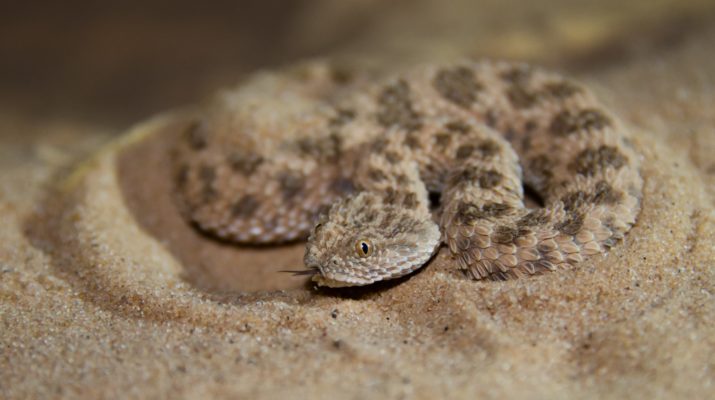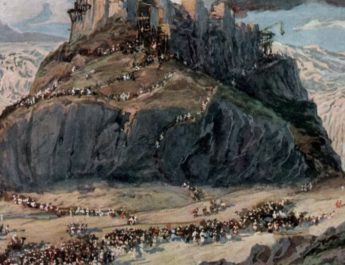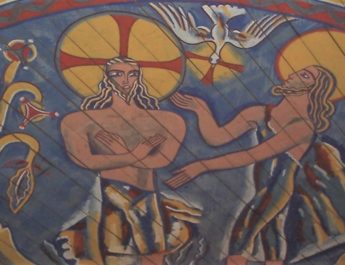Psalm 58
A Women’s Lectionary 47
To the leader:A Do Not Destroy.B Of David.C A Miktam.D
A “leader” = natsach. Properly, something that glitters from a distance. So, something that stands out, excels, has status/standing (such as a chief musician or superintendent of Temple services). This can also mean to be permanent or enduring.
B “Do Not Destroy” = al-tashcheth. 4x in OT. From al (not, never, nothing) + shachath (to go to ruin, perish, decay, batter, cast off, lose, one who destroys; literal or figurative). This is “Do Not Destroy,” probably the beginning words of a well known song whose melody was used for four different psalms.
C “David” = David. From the same as dod (beloved, love, uncle); the root may mean to boil, which is used figuratively to describe love. So, this implies someone you love such as a friend, a lover, or a close family member like an uncle. David’s name likely means something like “beloved one.”
D “Miktam” = Miktam. 6x in OT. Perhaps from katham (to carve, mark, stain). This is Miktam, which is some kind of technical term in the Psalms, but its meaning is uncertain. It may mean engraving – a way to refer to a poem.
1 Do you indeedE decreeF what is right,G you gods?H
E “indeed” = umnam. 5x in OT. From aman (to believe, endure, fulfill, confirm, support, be faithful, put one’s trust in, be steadfast; figuratively, to be firm, steadfast, or faithful, trusting, believing, being permanent, morally solid) OR from omnam (indeed, truly, no doubt); {from aman (see above)} OR from omen (faithfulness, truth); {from aman (see above)}. This is truly, really, or indeed. It shares a root with the word “amen.”
F “decree” = dabar. This is generally to speak, answer, declare, or command. It might mean to arrange and so to speak in a figurative sense as arranging words.
G “what is right” = tsedeq. This is rightness, righteousness, vindication. It is everything that is just or ethical. That which is right in a natural, moral, or legal sense. It also includes just weights (i.e. true weights). Figuratively, this is justice, righteousness, equity – even prosperity.
H “gods” = elem. 2x in OT. From the same as alam (to bind or tie fast; to be silent or speechless, whether voluntary or involuntary). This is silence, congregation, or justice as silent.
Do you judgeI peopleJ fairly?K
2 No, in your heartsL you deviseM wrongs;N
I “judge” = shaphat. This is to judge, defend, pronounce judgment, condemn, or govern. It can refer to God judging or to human judges. This is pronouncing a verdict in favor or against so it implies consequences or punishment. It can also mean to litigate or govern as one with authority.
J “people” = ben + adam. Literally “children of humanity.” Ben is son, age, child. It is son in a literal or figurative sense. Adam is perhaps from adam (to be red, make ruddy); related to adamah (ground, dirt, earth). This is man, humankind, also Adam’s name. It refers to a human individual or humanity.
K “fairly” = meshar. 19x in OT. From yashar (to be straight, right, even, agreeable). This is evenness, straightness, prosperity, or uprightness.
L “hearts” = leb. May be related to labab (to encourage; properly, to be encased as with fat; used in a good sense, this means to transport someone with love; used in a bad sense, it can mean to dull one’s senses). This is the heart, courage, one’s inner self, the mind, or the will. Heart is only used in a figurative sense in the Old and New Testaments.
M “devise” = paal. This is to do, make, work, or accomplish. Generally refers to regularly repeated or systematic action – so, to practice.
N “wrongs” = evel. Perhaps from aval (to deal unjustly, act in a wrongful way, a wrongdoer). This is injustice, wrong, moral evil, acts of violence, or unrighteousness.
your handsO deal outP violenceQ on earth.R
O “hands” = yad. This is hand, ability, power. Hand in a literal sense, but also what one can do or the means by which one does it.
P “deal out” = palas. 6x in OT. Perhaps from peles (a scale, weight). This is to flatten, make level, create a road, weigh, ponder.
Q “violence” = chamas. From chamas (to violate, do violence, to wrong; implies mistreatment). This is violence, cruelty, damage, wrong, injustice, or unrighteous. Violence implies a wrong done. The term is also used to describe unjust gain.
R “earth” = erets. Root may mean to be firm. This is earth, ground, field land, or country.
3 The wickedS go astrayT from the womb;U
S “wicked” = rasha. This is morally wrong so it refers to someone who is actively bad as wicked, criminal, an evil person, offender, condemned, or ungodly.
T “go astray” = zuwr. This is one who comes from someone else – a stranger. It is one who stops for lodging. Figuratively, it can also mean profane or one who commits adultery.
U “womb” = rechem. Related to racham (compassion, tender love, womb, compassion; the womb as that which cherishes the fetus). This is a womb.
they errV from their birth,W speakingX lies.Y
V “err” = taah. This is to wander, deceive, seduce, vacillate. It is to stray in a literal or figurative sense.
W “birth” = beten. Root may mean to be hollow. This is the belly or womb. It can also refer to a body more broadly.
X “speaking” = dabar. Same as “decree” in v1. See note F above.
Y “lies” = kazab. From kazab (to lie, be false or in vain, to fail; to deceive in a literal or figurative sense). This is a lie or deception. It can also be used figuratively to refer to an idol.
4 They have venomZ likeAA the venom of a serpent,BB
Z “venom” = chemah. From yacham (to be hot, mate; figuratively, to conceive). This is heat – figuratively it can be anger or fury. It can also refer to poison or venom as they can cause fever.
AA “like” = demuth. From damah (to resemble, liken, compare, consider, think). This is likeness, figure, model, shape, manner, or pattern.
BB “serpent” = nachash. Perhaps from nachash (to practice divination, learn by experience; to hiss as in whispering a spell). This is a serpent or snake. Used for the Serpent in the garden of Eden.
like the deafCC adderDD that stopsEE its ear,FF
CC “deaf” = cheresh. 9x in OT. From charash (to scratch, which implies etching or plowing; to manufacture regardless of materials used; figuratively, to devise or conceal; secrecy – hence, being silent, left alone, or speechless). This is deaf or a someone who is deaf in a literal or figurative sense.
DD “adder” = pethen. 6x in OT. This is some kind of venomous snake. Its root may mean to twist. Perhaps it is a cobra, asp, or adder.
EE “stops” = atam. 8x in OT – 4x of windows, 4x of closing lips or ears. This is to close, shutter, stop, contract. By analogy, it can refer to a recessed or beveled window.
FF “ear” = ozen. This is ear, hearing, audience, show. Properly, it is broadness – applied to its ear in reference to its shape.
5 so that it does not hearGG the voiceHH of charmersII
or of the cunningJJ enchanter.KK
GG “hear” = shama. This is to hear, call, consent, or consider. It implies listening intelligently, giving attention, and, because of these two factors, obedience and action are often implied.
HH “voice” = qol. This is a sound, used often for human voices. Also used when God speaks or angels, animals or instruments. It can be a cry or a noise, thunder or earthquakes and so on.
II “charmers” = lachash. 3x in OT. This is to whisper or charm i.e. murmur a spell like a magician does.
JJ “cunning” = chakam. From chakam (to be wise or teach wisdom; this is wisdom in thought, word, or action). This is wise, skillful, cunning, or artful.
KK “enchanter” = chabar + cheber. Literally “caster of spells.” Chabar is to unite, ally, attach, touch. It is to join in a literal or figurative sense. Also, specially, using magic knots or spells to fascinate or connect. Cheber is related to “enchanter” in v5. 7x in OT. From chabar (see note JJ above). This is association, shared, spell.
6 O God,LL breakMM the teethNN in their mouths;OO
LL “God” = Elohim.
MM “break” = haras. This is to break down, throw down, ruin, overthrow, or destroy. It is breaking down in pieces.
NN “teeth” = shen. From shanan (to sharpen, point, pierce; figuratively to teach). This is a tooth, ivory, something sharp, or, figuratively, a cliff.
OO “mouths” = peh. This is mouth in a literal or figurative sense. So, more literally, it can be beak or jaws. More figuratively, it refers to speech, commands, or promises.
tear outPP the fangsQQ of the young lions,RR O Lord!SS
PP “tear out” = nathats. This is to pull down, demolish, break down, raze, overthrow.
QQ “fangs” = maltaah. 1x in OT. From methalleoth (tooth, fang, jaw, cheek); from the same as tola (a worm or maggot, perhaps a crimson-grub of species coccus ilicis used to manufacture red dye; crimson, purple, or something dyed in those colors; an oppressor); from yala (to devout, utter without forethought); from the same as lua (to swallow, be rash). This is a grinder, large tooth, fang.
RR “young lions” = kephir. Perhaps from kaphar (to appease, cover, pacify, cancel). This is a young lion – maybe in the sense that it has a mane covering.
SS “Lord” = YHVH. From havah (to be, become) or hayah (to come to pass, become, be). This is the name of the God of Israel, the self-existent and eternal one, the tetragrammaton. This pronunciation has been lost to time so “Lord” is generally used in its place.
7 Let them vanishTT like water that runs away;UU
like grassVV let them be trodden downWW and wither.XX
TT “vanish” = ma’as. This is to reject, refuse, despise, disdain, reject, or spurn. It can also be to disappear or melt away.
UU “runs away” = halak. This is go, come, walk. It is walk literally and figuratively and includes people and animals. It can be used figuratively for one’s moral life – how we walk according to God’s way or against it. It can also refer to the walk of life as in the course one’s life takes, the choices we make, etc.
VV “grass” = chets. From chatsats (to divide, chop, pierce, distribute, shoot an arrow, an archer). This is an arrow or archer, shaft, staff. Properly, it is someone or something that pierces, such as an arrow. It can imply a wound. Used figuratively of God’s thunder bolt.
WW “trodden down” = darak. This is to tread, march, to walk. Can also mean affixing a string to a box since one needs to step on it to bend it in the process. So, also an archer.
XX “wither” = mul. This is to cut off, cut in pieces, or destroy. It is used for to circumcise. It can also mean to blunt.
8 Let them be like the snailYY that dissolvesZZ into slime;
likeAAA the untimely birthBBB that neverCCC seesDDD the sun.EEE
YY “snail” = shabluwl. 1x in OT. From the same as shebel (the part of the skirt that flows behind a woman – from a root that may mean flowing). This is a snail as a creature that seems to float over its slime.
ZZ “dissolves” = temes. 1x in OT. From masas (to dissolve, melt, waste away, be faint, refuse; to faint from illness, being tired, being afraid, or from grief) OR from masah (to melt, become liquid, consume; figuratively, to melt from fear). This is to dissolve, become liquid, disappear.
AAA “like” = halak. Same as “runs away” in v7. See note UU above.
BBB “untimely birth” = nephel + ishshah. Literally “something fallen of a woman.” Nephel is 3x in OT. From naphal (to fall, literal or figurative; death, calamity, wasting away). This is a thing that has fallen, a miscarriage. Ishshah is from ish (man); perhaps from enosh (human, humankind, mortal); from anash (to be weak, sick, or frail). This is woman, wife, or female.
CCC “never” = bal. From balah (to grow old, wear out, consume, waste, enjoy, fail, decay). This is not, lest, neither. Properly, it refers to a failure, so it implies nothing or not at all.
DDD “sees” = chazah. This is to gaze at – to see or behold. It can also refer to perceiving as a mental process or looking at something with pleasure. It can be used particularly to mean seeing a vision.
EEE “sun” = shemesh. This is sun or toward the east. Its root may mean being brilliant. Figuratively, this could be a ray or an arch.
9 Sooner than your potsFFF can feelGGG the heat of thorns,
whether greenHHH or ablaze,III may he sweep them away!JJJ
FFF “pots” = siyr. From a root that may mean to boil. So it is a pot or pan. It can also be a thorn because it grows quickly or a hook.
GGG “feel” = bin. This is to discern, consider, attend to. It refers to distinguishing things in one’s mind or, more generally, to understand.
HHH “green” = chay. From chayah (to live or keep alive literally or figuratively). This is alive, living, lifetime. It can also be used to describe someone’s age. It can refer to animals, plants, water, or a company or congregation of people. It is life in a very broad sense.
III “ablaze” = charon. From charah (to be displeased, burn with anger, glow, become warn; figuratively a blaze of anger, zeal, or jealousy). This is burning anger, fierceness, or wrathfulness.
JJJ “sweep…away” = sa’ar. 8x in OT. From sa’ar (to storm, scattered by a storm, blow away, rage, storm tossed; this is to toss in a literal or figurative sense). This is a storm or whirlwind. It can also be stormy.
10 The righteousKKK will rejoiceLLL when they see vengeanceMMM done;
KKK “righteous” = tsaddiq. Related to “what is right” in v1. From the same as tsedeq (see note G above). This is just, innocent, righteous, righteous one, or lawful.
LLL “rejoice” = samach. This is to rejoice or be glad. Properly, it is to brighten up in a literal or figurative sense.
MMM “vengeance” = naqam. 17x in OT. From naqam (to avenge, punish, have a grudge, execute). This can be a quarrel or vengeance.
they will batheNNN their feetOOO in the bloodPPP of the wicked.
11 PeopleQQQ will say, “Surely there is a rewardRRR for the righteous;
surely there is a God who judges on earth.”
NNN “bathe” = rachats. This is to wash, wash away – it can be complete or partial.
OOO “feet” = paam. From paam (to move, trouble; to tap in a regular rhythm; to agitate). This is a beat, stroke, footstep, or occurrence.
PPP “blood” = dam. Perhaps from damam (to cease, be or become mute, silent, still, cut off, hold peace, be astonished, die). This is blood, bloodshed, bloodguilt, lifeblood, and death. It is used for people and animals. More often blood from a wound or the blood of the innocent. Used figuratively for violence or for wine. Closely tied to life and death.
QQQ “people” = adam. Same as “people” in v1. See note J above.
RRR “reward” = peri. From parah (to bear fruit, grow, be fruitful, increase; bearing fruit in a literal or figurative sense). This is fruit or reward.
Image credit: “Cerastes vipera” – Saharan sand viper by Alex Slavenko, 2015.




